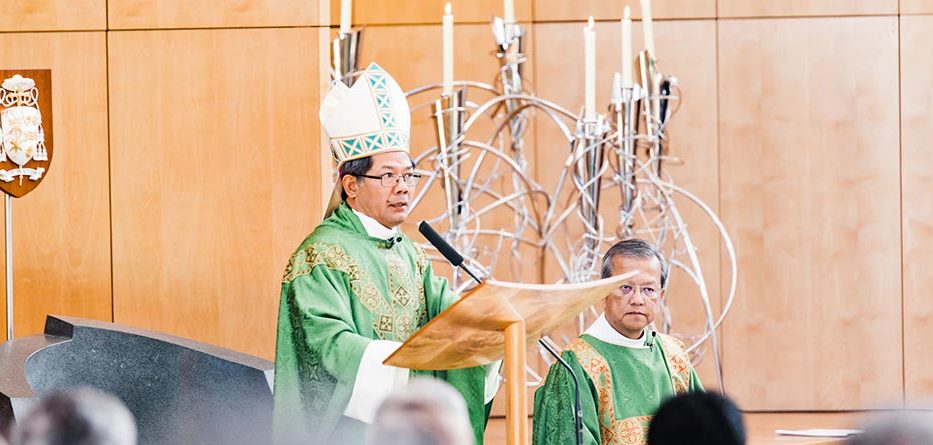Most Reverend Vincent Long Van Nguyen OFM Conv DD STL, Bishop of Parramatta
Homily for the Sixth Sunday in Ordinary Time in Year B 2018 at St Patrick’s Cathedral, Parramatta
11 February 2018
Dear friends,
Many years ago, former prime minister Paul Keating gave a powerful speech on Indigenous injustice in Redfern, Sydney. He spoke of the wound in Australia’s soul, which can be healed so long as the fight for indigenous equality continues and hope remains. It was the first time an Australian political leader admitted the impact of white settlement, the discriminatory and exclusionary practices based on ignorance and prejudice that led to widespread destruction of Indigenous people and culture. It is fitting that we Catholic Australians reflect on and contribute to the healing of the soul of our society in the light of increased awareness of past and present Indigenous injustices as well as the challenge of God’s restorative justice.
Scriptures this Sunday also speak about healing that has profound implications for us. More than a story about the healing of an individual with physical infirmities, the Word of God summons us to confront more insidious forms of sickness and create a more just, inclusive and compassionate society.
The Gospel tells us the story of Jesus’ encounter with the leper, which is situated among other healing stories. He has healed the demoniac in the synagogue, Peter’s mother-in-law in her house and many other sick people throughout all Galilee. He has presented himself as a healer, a champion of the masses and a preacher with authority. In his words and actions, people feel the power of the God of the covenant and the presence of His reign.
The story of his engagement with the leper, however, moves Jesus’ intents and purposes to another level. It shows that more than concerned with the individual’s wellbeing, he is not afraid to confront the discriminatory and exclusionary practices based on ignorance and prejudice. This ignorance and prejudice is codified in the Book of Leviticus. The leper is condemned to a life of shame and harsh social isolation. The first reading gives us a brief but revealing description of how lepers are treated or mistreated in Israel.
By reaching out and touching the leper, Jesus breaks ranks with his contemporaries. He challenges unjust societal conventions and discriminatory practices. This is what we might call “vintage Jesus”, one who consistently stands on the side of the social outcast; one who bats for the marginalised even at the cost of being made an outcast himself. In fact, this is what happens to him as a result of his interaction with the leper. The Gospel tells us that afterwards, Jesus “had to stay outside in places where nobody lived”. His prophetic stance earns him social isolation, which would culminate in Gethsemane and on the cross. It is also a warning to us that authentic discipleship is a costly affair because it mirrors the self-emptying missionary journey of Jesus.
After being cured of leprosy, the man was told to go to the priest so that he could be readmitted into the community. Even though he had performed the healing outside the temple system, Jesus did not stop at the personal level. As he did to the woman who had touched him and found herself healed of her haemorrhage, Jesus was interested in confronting injustices towards the vulnerable. By commanding the man to go to the temple, he challenges the community to examine its attitudes and practices in respect of the marginalised and the outcast. The healing of the leper moves from the healing of a sick individual to the healing of a sick society.
Brothers and sisters,
The message of the Gospel is that we cannot be disciples of Jesus and fail to address injustices against God’s poor and vulnerable. Discipleship is a journey that demands moral courage because it forces us to abandon security in favour of vulnerability, self-interest in favour of passion for justice and compassion for God’s poor. Jesus shows himself to be a boundary breaker. He constantly goes beyond the borders of every kind and affirms the humanity of those who are marginalised out of fear and ignorance. In so doing, he invites us to step beyond our fears and to expand the boundaries of our love.
Let us learn from Christ who immersed himself totally in the coalface realities of pain, suffering, isolation and condemnation that many experience. It is that precarious existence where the true cost of our discipleship is counted, because we dare to walk with the lepers of our time, just like Jesus did before us. They could be asylum seekers, the homeless, the Indigenous, the victims of injustice, et cetera. Ultimately, we are challenged to prod at our own sense of security and to stretch our capacity to love. For that is where the God of solidarity calls us to be. May we learn to walk with the God of love, inclusion and compassion, as we endeavour to make His Kingdom a reality in the world.








